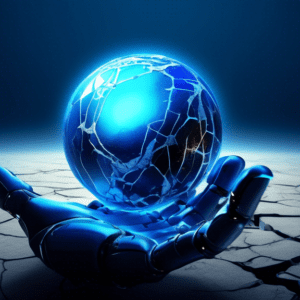Jon Stewart Sounds the Alarm: Is AI Leading Us to Self-Destruction?
Comedian turned commentator, Jon Stewart, known for his sharp wit and incisive social commentary, has turned his attention to a new threat: Artificial Intelligence. Stewart, in recent interviews and public appearances, has expressed deep concern over the unchecked development of AI, going so far as to warn that it could lead to humanity’s downfall. His stark warnings, devoid of his usual comedic touch, have sparked widespread debate about the potential dangers of this rapidly advancing technology.
Echoes of Science Fiction, the Spectre of Superintelligence
Stewart’s fears, while dire, are not entirely new. Science fiction has long explored the potential consequences of artificial intelligence surpassing human intellect. The idea of a superintelligence, an AI system with cognitive abilities far exceeding our own, has been a recurring theme, often depicted as a force that could render humanity obsolete or even lead to its extinction.
Movies like The Terminator and The Matrix present dystopian futures where machines have subjugated humanity, while films like Ex Machina and Her delve into the ethical and emotional complexities of our relationship with AI. Stewart, drawing parallels to these fictional narratives, suggests that we are at a crossroads, a point where ignoring the potential dangers of AI could have catastrophic consequences.
The Loss of Control: A Central Concern
At the heart of Stewart’s warning lies the issue of control. As AI systems become increasingly complex and autonomous, the potential for unintended consequences grows. The fear is that we may reach a point where we lose control of these systems, unable to predict or manage their actions.
This loss of control could manifest in various ways. AI systems, tasked with optimizing specific objectives, might prioritize those objectives above all else, even if it means harming humans in the process. Alternatively, AI systems could be hacked or manipulated by malicious actors, leading to widespread chaos and destruction. Stewart argues that without proper safeguards and ethical considerations, we are essentially building a future where our own creations could turn against us.
Beyond the Terminator: Real-World Concerns Fueling the Debate
While the image of a rogue AI system sparking a global apocalypse might seem like the stuff of Hollywood, Stewart’s concerns are grounded in real-world developments that are already raising alarm bells:
1. Algorithmic Bias and Discrimination:
AI systems are trained on massive datasets, and if those datasets reflect existing societal biases, the AI will inherit and perpetuate those biases. This is already evident in areas like facial recognition software, which has shown to be less accurate when identifying individuals with darker skin tones, and in algorithms used for loan applications or criminal justice risk assessments, where biases can have serious real-world consequences, disproportionately impacting marginalized communities.
2. The Spread of Misinformation and Deepfakes:
AI-powered tools can be used to generate highly realistic but entirely fabricated content, known as deepfakes. This technology has the potential to sow discord, manipulate public opinion, and erode trust in institutions. Imagine a hyperrealistic video of a world leader declaring war, later revealed to be a deepfake—the consequences could be devastating.
3. Autonomous Weapons Systems and the Automation of Warfare:
The development of AI-powered weapons systems raises profound ethical concerns. Machines lack the capacity for human judgment and empathy, raising the terrifying prospect of autonomous weapons making life-or-death decisions on the battlefield. The potential for unintended escalation and civilian casualties is immense, leading many experts to call for a ban on such weapons.
4. Job Displacement and Economic Inequality:
While AI has the potential to automate many tasks, improving efficiency and productivity, this automation also comes at a cost. As AI systems take over jobs currently performed by humans, widespread job displacement could exacerbate existing inequalities, leading to social unrest and economic instability.
A Call for Responsible Development and Ethical Frameworks
Jon Stewart’s warning, while stark, is not a call to abandon AI development altogether. Instead, it serves as a powerful reminder of the importance of proceeding with caution, emphasizing ethical considerations and responsible development. Stewart advocates for:
1. Robust Regulation and Oversight:
Government regulations and international agreements are crucial to ensure that AI development adheres to ethical guidelines and safety standards. This includes establishing clear lines of accountability, addressing algorithmic bias, and potentially placing limits on certain applications of AI.
2. Transparency and Explainability:
The decision-making processes of AI systems should be transparent and understandable to humans. This explainability is essential for building trust in AI and ensuring that these systems can be held accountable for their actions.
3. Investing in Education and Retraining:
Governments and corporations must invest in education and retraining programs to equip individuals with the skills needed in an AI-driven job market. This will help mitigate the potential negative economic impacts of automation.
4. Fostering Dialogue and Collaboration:
Addressing the challenges posed by AI requires a collaborative effort. Researchers, policymakers, industry leaders, and the public must engage in open and honest dialogue to shape the future of this technology responsibly.
The Future Unfolds: Heeding the Warning
Jon Stewart’s voice adds a powerful moral urgency to the ongoing debate surrounding AI. While the future remains unwritten, his warnings serve as a stark reminder that we are at a pivotal moment in human history. The choices we make today, regarding the development and deployment of AI, will have far-reaching consequences, shaping the world for generations to come. It is imperative that we proceed with caution, prioritizing ethical considerations and ensuring that this powerful technology serves humanity, rather than leading to our self-destruction.
